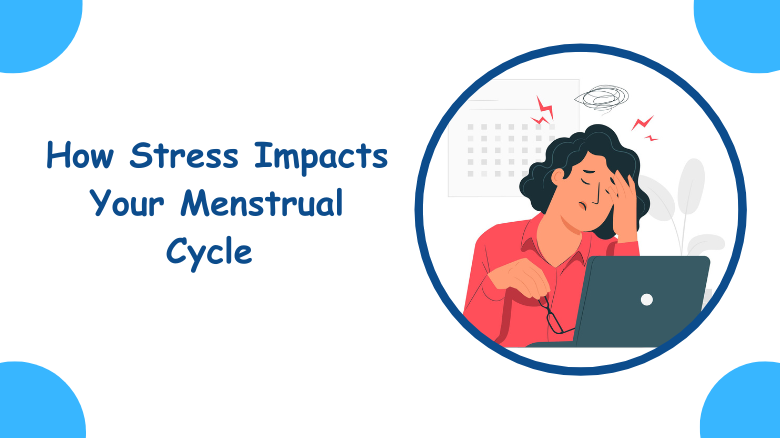Read Now
Getting your Trinity Audio player ready... |
Women’s health is a delicate balance of body, mind, and emotions. While we often talk about healthy eating, exercise, or medical check-ups, one area that deserves more attention is the connection between stress and reproductive health. Many women are surprised to learn just how stress impacts your menstrual cycle and affects overall well-being.
Harsha Hospitals, recognized as one of the best hospitals in Hyderabad, offers comprehensive care for women at every stage of life—from menstruation and pregnancy to menopause. Guided by Dr. M. Neetha, the best gynecologist in KPHB, the hospital provides advanced treatments and holistic support to help women manage issues like irregular periods, hormonal imbalance, and fertility concerns.
Recognizing this link is the first step toward achieving better health. So, let’s explore the relationship between stress and menstrual cycle health in detail.
Stress and Menstrual Cycle: The Science Behind It
Your menstrual cycle is controlled by a system called the hypothalamic-pituitary-ovarian (HPO) axis. This system relies on hormonal signals to regulate ovulation and menstruation. When you’re stressed, your body produces more cortisol (the stress hormone). High cortisol levels interfere with the release of reproductive hormones like estrogen and progesterone.
This is the main reason how stress affects periods—your cycle may become irregular, heavier, lighter, or even stop temporarily. Stress, in other words, disrupts the natural rhythm of your body.
How Stress Affects Periods
Stress can influence your menstrual cycle in different ways, and not every woman experiences the same symptoms. Here are some common changes:
1.Irregular periods - Your cycle may become shorter, longer, or vary unpredictably.
2.Missed periods – In cases of extreme stress, ovulation may not occur, leading to skipped cycles.
3.Heavy or light flow – Stress can alter hormone levels, changing the volume of bleeding.
4.Severe cramps – Tension in the body may worsen menstrual pain.
5.Premenstrual symptoms – Stress often intensifies PMS, causing mood swings, bloating, and fatigue.
This shows why stress and irregular periods are commonly linked. If these changes become frequent, it’s important to seek medical advice.
Hormonal Imbalance Due to Stress
One of the most significant effects of stress on women’s health is hormonal imbalance due to stress. When estrogen and progesterone levels fluctuate abnormally, women may experience:
- Acne and skin changes.
- Breast tenderness.
- Mood instability.
- Changes in appetite and weight.
- Difficulty in conceiving.
A regular menstrual cycle reflects balanced hormones, making stress management vital for both reproductive and overall health.
How Chronic Stress Affects Menstrual Health
Occasional stress may cause temporary changes, but chronic stress can have deeper and long-term effects. How chronic stress affects menstrual health includes:
- Long-term irregular cycles.
- Increased risk of developing conditions such as PCOS (polycystic ovary syndrome).
- Reduced fertility due to irregular ovulation.
- Increased risk of anxiety and depression, which further worsens menstrual problems.
These challenges highlight the importance of stress management and medical guidance. Ignoring stress-related menstrual issues can lead to complications later in life.
The Emotional Side of Stress and Menstruation
Periods are not just physical; they are also closely tied to emotions. Stress can make PMS symptoms worse—leading to irritability, sadness, or anxiety. Women often report feeling overwhelmed or fatigued before their cycle when stress levels are high.
This emotional connection further proves how stress impacts your menstrual cycle not just physically but mentally too. A holistic approach, including mental well-being, is key to managing these changes.
Practical Tips to Manage Stress and Support Menstrual Health
While medical care is essential, lifestyle changes also play a huge role in protecting menstrual health. Here are some simple but effective steps:
- Exercise regularly – Yoga, walking, and aerobic activities reduce cortisol and improve hormonal balance.
- Eat a balanced diet – Include whole grains, fruits, vegetables, and omega-3-rich foods for hormone support.
- Prioritize sleep – At least 7–8 hours of restful sleep helps restore your body.
- Practice relaxation techniques – Meditation, breathing exercises, and mindfulness lower stress levels.
- Seek medical advice – If stress-related menstrual problems persist, consult a gynecologist.
Why Choose Harsha Hospitals?
When it comes to women’s health, personalized care makes all the difference. Harsha Hospitals is recognized as the best gynecologist hospital in Kukatpally and also as the best hospital for pregnancy in Hyderabad. Under the expert supervision of Dr. M. Neetha, every woman receives specialized guidance for menstrual health, fertility, pregnancy, and beyond.
Whether you’re struggling with stress and irregular periods, hormonal imbalance due to stress, or planning for a healthy pregnancy, Harsha Hospitals provides advanced treatments with compassion and care.
Call to Action
Stress may be a part of life, but it shouldn’t take control of your health. If you’ve noticed changes in your cycle or are concerned about how stress affects periods, don’t ignore the signs. Timely guidance can help restore balance and protect your long-term well-being.
Schedule a visit to Harsha Hospitals today, one of Hyderabad’s leading healthcare centers, for expert care. Book your consultation with Dr. M. Neetha, the best gynecologist in KPHB, and take charge of your menstrual health.
“Your menstrual health reflects your overall well-being. Don’t let stress take control—seek expert care at Harsha Hospitals.”



